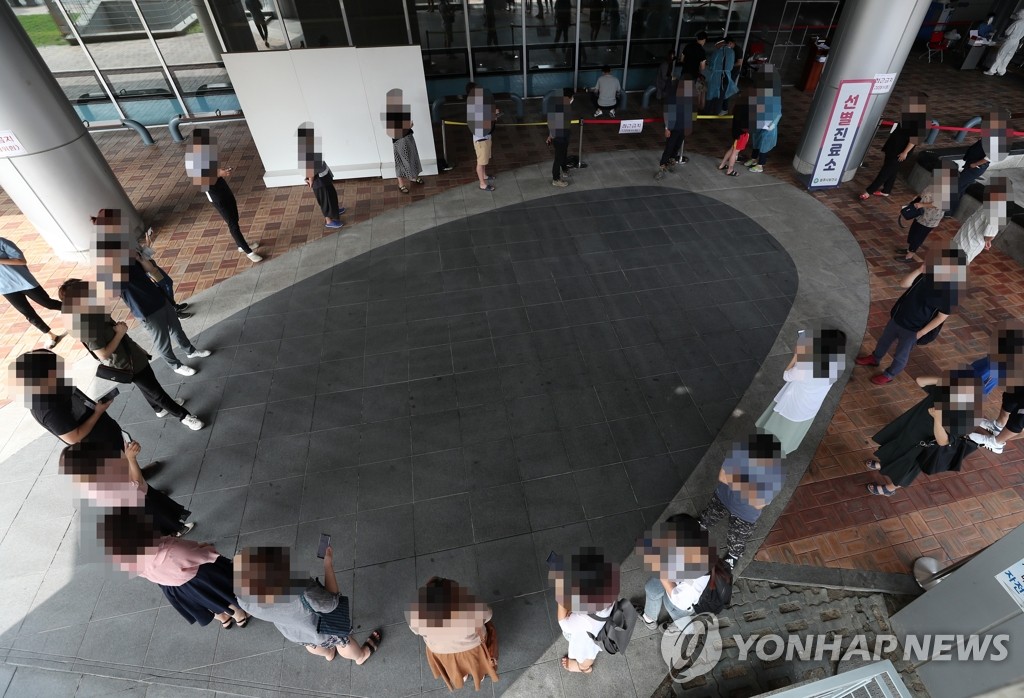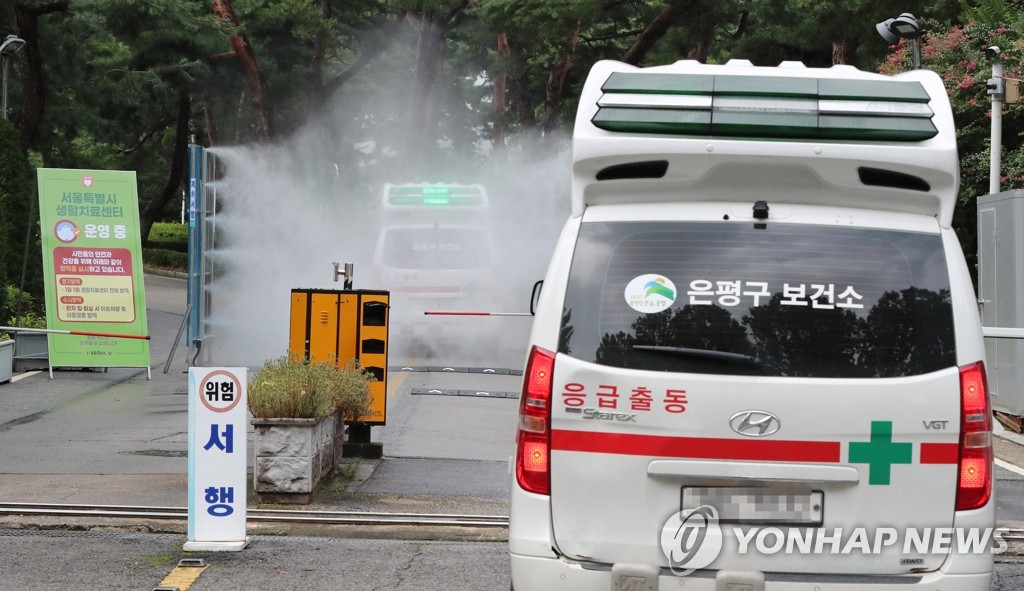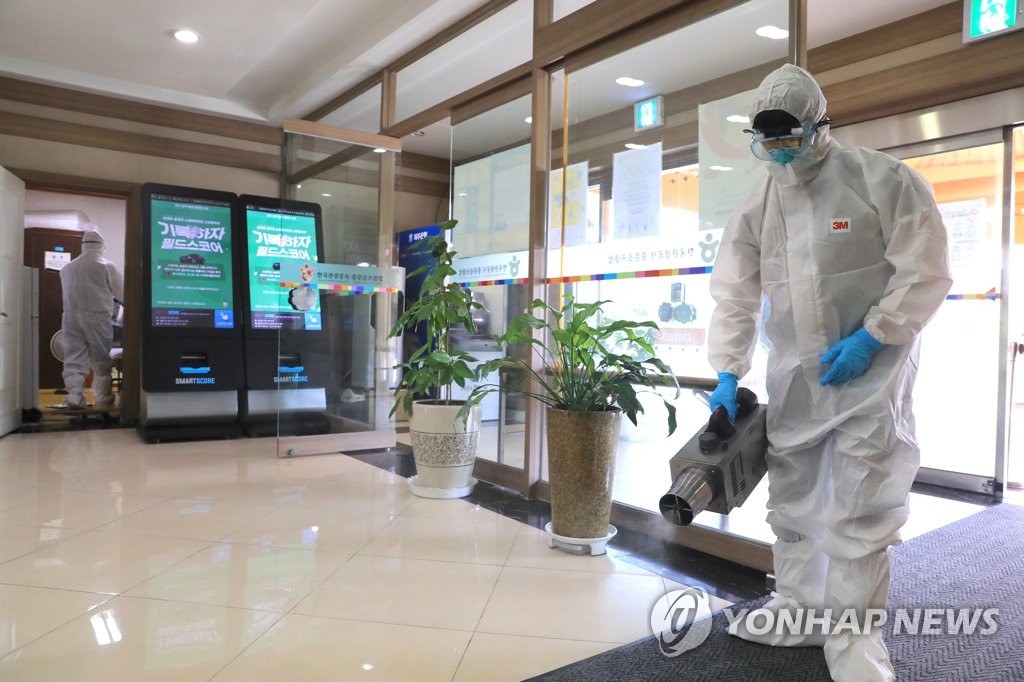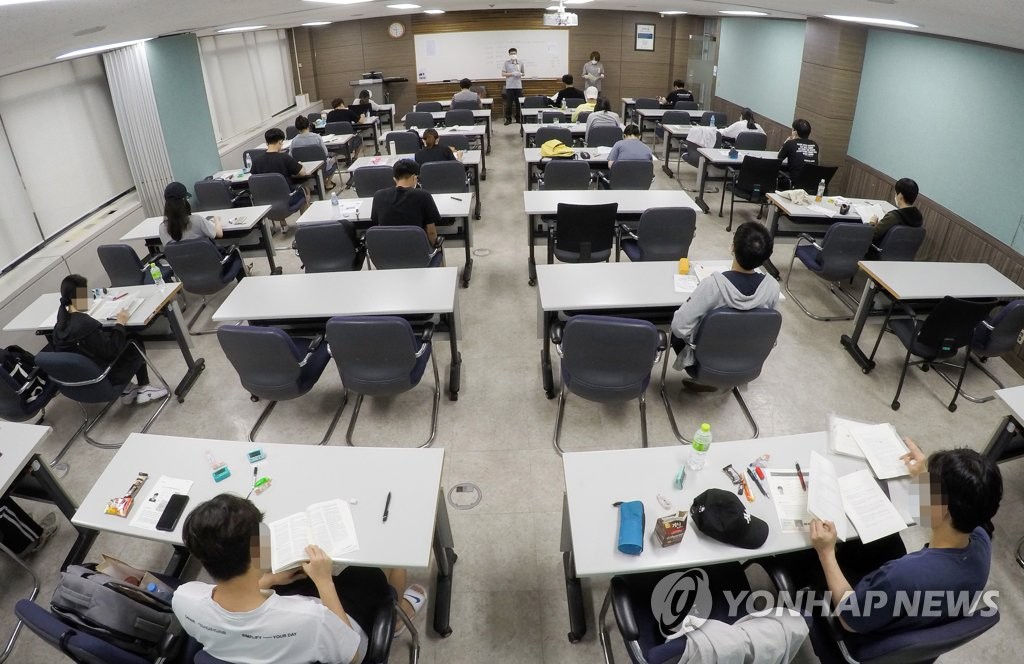- California Assembly OKs highest minimum wage in nation
- S. Korea unveils first graphic cigarette warnings
- US joins with South Korea, Japan in bid to deter North Korea
- LPGA golfer Chun In-gee finally back in action
- S. Korea won’t be top seed in final World Cup qualification round
- US men’s soccer misses 2nd straight Olympics
- US back on track in qualifying with 4-0 win over Guatemala
- High-intensity workout injuries spawn cottage industry
- CDC expands range of Zika mosquitoes into parts of Northeast
- Who knew? ‘The Walking Dead’ is helping families connect
S. Korea may further tighten virus curbs as daily infections top 300
South Korea’s health authorities warned Friday they will consider upping the level of social distancing to the highest level if nationwide outbreaks of the new coronavirus continue after the weekend.
The country’s virus fight has reached a critical phase as its daily new virus cases surpassed 300 for the first time since early March on Friday due largely to church-linked cluster infections in the wider capital area and other regions.
The country added 324 more COVID-19 cases, including 315 local infections, raising the total caseload to 16,670, according to the Korea Centers for Disease Control and Prevention (KCDC).
Friday’s tally marked the most since March 8 when the daily virus cases reached 367.
The number of daily infections has been in the triple digits since last Friday when 103 additional cases were reported, with about 1,900 cases being newly identified in the past eight days.
A resurgence in virus cases, mostly traced to churches, have been reported in Seoul and its surrounding Gyeonggi Province, home to half of the country’s 51 million people.




Citizens wait to receive new coronavirus tests at a screening center in Wonju, 132 kilometers east of Seoul, on Aug. 21, 2020. (Yonhap)
Health authorities warned that the wider capital region should brace for another wave of the COVID-19 pandemic and that the country stands on the cusp of a nationwide outbreak.
Alarmed by soaring virus cases, South Korea raised the level of social distancing in Seoul and Gyeonggi Province on Sunday by one notch to Level 2 in the three-tier system for two weeks. The measure was expanded to Incheon, west of Seoul, Wednesday.
Health authorities said this weekend will be a critical time in considering raising anti-virus measures to Level 3.
“There is limitation in stemming the current spread of the virus only with quarantine measures,” KCDC Director Jeong Eun-kyeong said in a briefing.
“If the Level 2 guidelines are not fully enforced and the virus continues to spread, we will have to consider raising the level,” she said.
Under the Level 2 scheme, indoor meetings of 50 or more people and open-air gatherings of 100 or more people are banned in principle. So-called risk-prone facilities, including karaoke rooms, clubs, PC cafes and buffets, have been ordered to shut down.
The government has been cautious about raising anti-virus measures to Level 3 as doing so has far-reaching social and economic impacts.
The highest anti-virus curbs can be issued when the number of daily virus cases reaches a two-week average of 100-200 and the doubling of new COVID-19 cases occurs more than twice a week.
If the level is raised, gatherings of 10 or more people will be banned, and offline school classes will be suspended.
Nearly 80 percent of the newly identified local infections were reported in the greater capital region.
But more virus cases have been newly added outside the wider Seoul area over the past week, spawning concerns about nationwide outbreaks. Excluding the southern resort island of Jeju, 16 major cities and provinces reported new cases.
Of the newly reported local infections, 125 cases were reported in the capital city of Seoul, 102 from Gyeonggi Province and 17 from Incheon, just west of Seoul.
The southeastern port city of Busan reported eight additional infections. The central city of Daejeon reported six more cases, and four were reported from the southeastern city of Daegu and five from the southwestern city of Gwangju.
“We are at a critical juncture of whether another wave of the outbreak will unfold in a full-fledged manner,” Vice Health Minister Kim Ganglip said in a daily briefing.
Since the first outbreak on Jan. 20, South Korea’s new daily virus cases peaked at 909 on Feb. 29 and have been declining on massive testing and contact tracing. In early May, the country relaxed six weeks of strict social distancing on the flattened virus curve.
Health authorities said a surge in cases traced to a church in northern Seoul and infections tied to a massive weekend rally in central Seoul appear to have served as a catalyst in spurring nationwide outbreaks.
Cases tied to the Sarang Jeil Church in northern Seoul, a new hotbed of the flare-up in virus cases, came to 732 as of noon, up 56 from a day earlier.
The Sarang Jeil Church-linked infections marked the largest after more than 5,000 virus cases traced to the minor religious sect of Shincheonji were reported in Daegu in mid-February and early March.
The KCDC also urged participants in the anti-government rally held on Saturday to immediately take virus tests regardless of showing symptoms. Many Sarang Jeil Church members took part in the rally.
The country has been facing hurdles in tracing potential cases as some of protesters had traveled to Seoul from other cities, hundreds of members of Sarang Jeil Church refused to get tested, and the church provided an inaccurate list of its members to health authorities.
Cases linked to the weekend march came to 71 as of noon, up 53 from the previous day. Of them, four cases came from police officers who were mobilized to respond to the rally.
“Considering the (two-week) incubation period, infections tied to the church and the protest are expected to pop up in full swing,” Kim said.
Sporadic cluster infections continued to pile up. Cases tied to a sports facility in northern Seoul rose by 10 to 28. Infections traced to a troupe reached 17, up one case over the past 24 hours.
“The COVID-19 pandemic is spreading at a startling pace across the nation,” Jeong said.
The country reported nine imported cases, with three cases coming from the United States and another three from the Philippines.
Cases coming in from overseas rebounded back to double-digit numbers since mid-June for about a month, but such infections recently slowed.
South Korea reported two more deaths, raising the tally to 309. The fatality rate was 1.85 percent.
The total number of people released from quarantine after making full recoveries stood at 14,120, up 57 from the previous day.
The country has carried out 1,754,123 coronavirus tests since Jan. 3.








![일본 사도광산 [서경덕 교수 제공. 재판매 및 DB 금지]](http://www.koreatimesus.com/wp-content/uploads/2024/07/PYH2024072610800050400_P4-copy-120x134.jpg)


